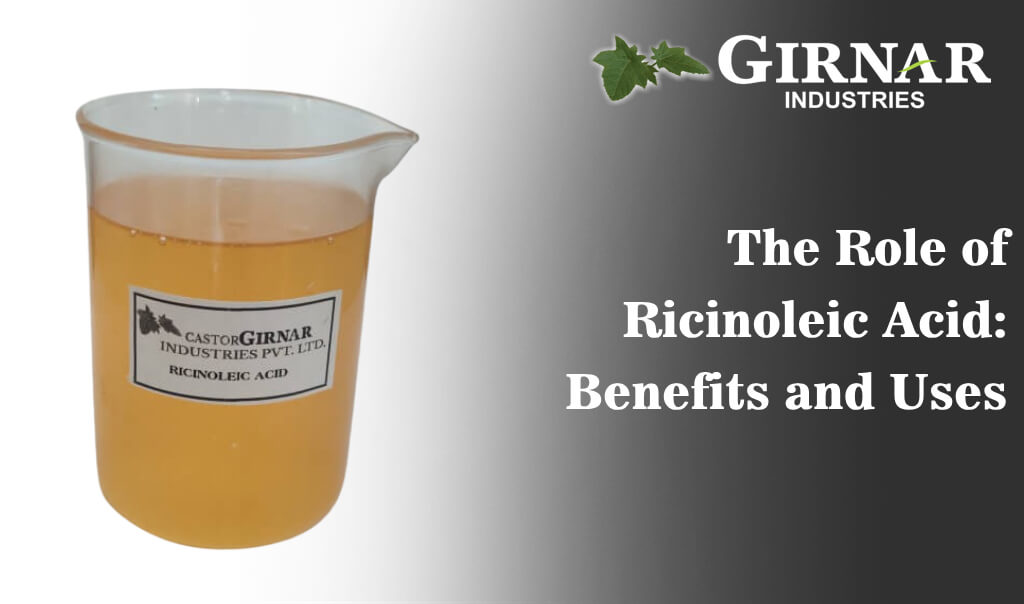Ricinoleic acid quietly establishes itself as a versatile and helpful natural chemical. This simple acid, derived from castor oil, has gained popularity for its extraordinary characteristics and wide range of uses. In this blog post, we will look at the benefits of ricinoleic acid and how it may be used in everyday life.
What Is Ricinoleic Acid?
Ricinoleic acid is a monounsaturated fatty acid from the omega-9 fatty acid family. It is mostly present in castor oil, a vegetable oil made from the seeds of the Riccinus communis plant. Ricinoleic acid is a simple, naturally occurring chemical that has been used for ages, unlike some other compounds with fancy names.
Skin Benefits
It is remarkable for its possible skin advantages. Ricinoleic acid, known for its moisturizing characteristics, has the potential to be a game changer for individuals looking for a natural solution to dry and irritated skin. When used topically, it helps to retain moisture, preventing the skin from becoming overly dry.
In addition, ricinoleic acid is thought to help reduce inflammation. It is a popular choice for people with skin problems like eczema or psoriasis because of this. Its relaxing properties can help soothe irritated skin, making it healthier and more comfortable.
Hair Care
It is a popular ingredient in hair care products because it has benefits for more than face care. Regularly using castor oil, which is high in ricinoleic acid, can help your hair stay healthy and look better. Because it moisturizes, it can feed the hair shaft and make it less dry and frizzy.
There is also evidence that ricinoleic acid can help hair grow. It may help make hair stronger and thicker by increasing blood flow to the head and giving hair follicles the nutrients they need. Adding castor oil with ricinoleic acid to your normal hair care routine is an easy and natural way to fix the problem.
Digestive Health
Moving on to internal benefits, It has shown the potential to improve digestive health. Castor oil has traditionally been used as a laxative, and this action is due to the presence of ricinoleic acid. It works by increasing smooth muscle spasms in the intestines, which aids with bowel motions.
However, while using castor oil internally, use caution because excessive ingestion can have negative consequences. Before taking castor oil for digestive purposes, consult a healthcare practitioner to ensure a safe and appropriate dosage.
For More Blogs:- cold pressed castor oil benefits, uses of castor oil
Anti-Microbial Properties
It has antibacterial qualities as well as moisturizing and anti-inflammatory capabilities. In other words, it might help fight some germs and fungi, which could make it a useful tool for keeping your teeth healthy. Castor oil is included in some natural toothpaste and mouthwash formulations to leverage its antibacterial capabilities.
Joint Pain Relief
The anti-inflammatory properties of ricinoleic acid can help people who are dealing with joint pain or gout. When put on the skin, it can help reduce swelling in the hurt joints, making it a natural and soothing way to treat pain.
Practical Uses
Now that we’ve explored the various benefits of ricinoleic acid let’s discuss some practical ways to incorporate it into your daily routine.
DIY Moisturizer:
Combining castor oil with additional natural ingredients such as coconut oil or shea butter results in a simple and efficient moisturizer. Apply it to dry areas of your skin for a nutrient boost.
Hair Mask:
Make a castor oil-based DIY hair mask to revitalize your hair. Mix it with equal parts coconut oil, apply to your hair, and let it sit for an hour before washing. This can help to replenish moisture and maintain healthy hair.
Massage Oil:
Castor oil can be used as a massage oil for painful muscles or joints to benefit from its anti-inflammatory qualities due to ricinoleic acid. Its relaxing properties can bring relaxation after a long day.
Oral Health Rinse:
Consider incorporating castor oil into your oral care routine by making a DIY mouthwash. Its antibacterial characteristics may help to keep the mouth healthy.
Conclusion
Ricinoleic acid, found in castor oil, stands as a testament to the power of natural compounds in promoting overall well-being. From skincare to hair care and digestive health, its versatility makes it a valuable addition to your daily routine. As you explore the benefits and uses of ricinoleic acid, remember to embrace simplicity and the age-old wisdom of natural remedies.
FAQ’S
Which oil contains Ricinoleic acid?
Castor oil is known for its high concentration of Ricinoleic acid, which accounts for approximately 90% of its fatty acid composition. This acid, obtained from the castor bean plant, offers the oil its unique qualities and several health advantages.
What foods have Ricinoleic acid?
Ricinoleic acid is mainly found in castor oil, however it is rarely found in foods. Castor beans are hazardous when eaten raw, but the oil derived from them is safe for food and topical application when properly processed.
What is the benefit of Ricinoleic acid in soap?
Ricinoleic acid's moisturising and anti-inflammatory qualities make it an important ingredient in soap manufacture. It can help soothe and nourish the skin, making it especially useful for people with sensitive or dry skin issues.
Does Ricinoleic acid help eyelash growth?
Anecdotal evidence suggests that Ricinoleic acid, when applied to the lashes in the form of castor oil, can encourage growth and thickness. However, scientific research is limited, and individual outcomes may differ.
What is Ricinoleic acid used for?
Ricinoleic acid has a wide range of applications, including cosmetics and skincare, as well as industrial and pharmacological uses. Its moisturising, antibacterial, and anti-inflammatory characteristics make it an effective ingredient in a wide range of goods, including lotions, creams, haircare products, and even medicinal formulations.


